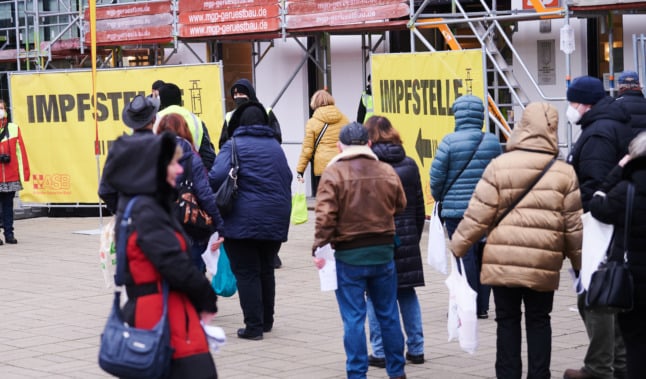What’s going on?
Germany could be set to hold a vote on the issue of mandatory Covid jabs by the end of the year with an eye to introducing compulsory jabs for the general population in February or March next year.
The news comes after incoming Chancellor Olaf Scholz (SPD) declared his support for the move during crisis talks between the federal and state governments on Tuesday.
READ ALSO: German MPs to vote on compulsory Covid jabs ‘by end of year’
In the days running up to meeting, business leaders and health experts had urged Germany’s incoming government to make sweeping changes to its vaccination drive.
In its 10-point plan released on Monday, the German Association of Small to Medium-Sized Businesses (DMV) called for mandatory vaccinations for the German population alongside other measures such as an instant work permit for foreign medical staff and uniform ‘2G plus’ at events, meaning only vaccinated and recovered people with a negative test can enter.
On Sunday, the German Association of Virologists issued a statement calling for “urgent political action”. Officials should focus on “increasing the vaccination rate, if necessary by introducing compulsory vaccination”, they wrote.
The pleas from business and medicine come after the president of the German Employers’ Association, Rainer Dulger, called for a general vaccination mandate in an interview with the Rheinische Post.
With infection rates spiralling in Germany, politicians have been debating whether to follow neighbouring Austria’s lead and introduce a general vaccine mandate.
The discussion has been ongoing for the past few weeks, but with fears growing about the threat of the recently discovered Omicron variant, the debate has taken on a new sense of urgency.
However, with other options currently on the table for controlling the fourth wave, such a mandate is likely to be seen by many politicians as a last resort.
READ ALSO: Germany must be prepared for Omicron variant, warns top virologist
How would a general vaccine mandate work?
As you might expect, this wouldn’t be a case of physically forcing anyone to get vaccinated, but rather of enshrining the need to do so in law. People who aren’t registered as vaccinated will likely recieve a letter reminding to book an appointment, and a deadline by which to do so. If after a certain grace period, people still haven’t go their jabs, they’ll probably be issued with a hefty fine.
When the vaccine mandate is introduced in Austria next February, media reports suggest this fine could be as high as €3,600 for people who avoid their initial jabs, and around €1,750 for people who turn down their boosters. People who then refuse to pay the fine could face up to four weeks in prison. If Germany ended up introducing a similar vaccine mandate, fines could be a bit more lenient – but they would need to be high enough to deter the majority of people from flouting the rules.
Once again, the harsher side of the penal system – including prison sentences – could also be used if the fines proved ineffective.
Why does this matter?
The question of how to improve the Germany’s languid vaccination rate has been frustrating politicians since the campaign started to lose momentum in summer this year. Currently, Germany has one of the lowest vaccination rates in western Europe, with just 68.4 percent of the population having had their full course of jabs. When more of the population is vaccinated, Covid poses less of a threat to public life, since breakthrough infections are rare in vaccinated people and hospitalisations are even rarer.

A closed bar in Berlin during shutdown earlier this year, when curfews were imposed. Experts believe higher vaccinations could break the cycle of endless restrictions and reopenings. Photo: picture alliance/dpa | Christophe Gateau
READ ALSO: Why is German-speaking Europe lagging on Covid vaccines?
Medical experts have also suggested that a very high vaccination rate could enable Germany to keep infection rates consistently low and minimise the strain on health services. Based on the highly infectious Delta variant, a model produced by the Robert Koch Institute (RKI) suggested that a vaccination rate of 90 percent or more in over-60s and 85 percent in 12-59 year olds would keep weekly incidences of Covid below 50 cases per 100,000 people. However, with the Omicron variant – which is suspected to be even more infectious than Delta – an even higher vaccination rate could be needed.
As health experts and politicians have repeatedly said, a high vaccination rate could offer a way out of the pandemic and break the cycle of endless lockdowns and restrictions. In contrast, a low vaccination rate could lead to the pandemic running rampant and even, as has been the case in Africa, result in the emergence of dangerous new variants.
Would a vaccine mandate be legal?
There’s been a lot of discussion over mandatory Covid vaccinations and whether such a law could contravene the German constitution. Politicians from the liberal FDP – who tend to be against compulsory jabs – have claimed that making jabs compulsory could go against the right to bodily autonomy that’s mentioned in the constitution.
However, some legal experts have rejected this view. Speaking to RND on Monday, Göttingen-based criminal lawyer Gunnar Duttge claimed the German constitution did not give vaccine sceptics the right to endanger other people through unreasonable behaviour.

People wait outside a newly opened vaccination centre in Marzahn, Berlin. Photo: picture alliance/dpa | Annette Riedl
“That the constitution does not permit compulsory vaccination is a widespread misconception,” Duttge said. “In reality, the state can do a great deal while maintaining the regulatory framework of fundamental rights.”
The question of whether a vaccination mandate is legally permissible has nothing to do with individual rights, since Germany’s Constitutional Court has always considered the individual in the context of a wider community, rather than as an isolated being, he added. However, a move towards compulsory vaccination would have to be proportional to the threat.
That means that compulsory vaccination is likely to be permissible by law if the pandemic reaches a situation where, according to medical experts, everyone needs to cooperate to prevent putting the population in danger.
What do government officials say?
In the run-up to the September federal election, talking about mandatory vaccination remained something of a taboo, but with the situation in Germany worsening by the day, incoming Chancellor Olaf Scholz (SPD) has signalled his support for the move.
Having agreed to implement a vaccination mandate for medical and care workers on the request of state leaders, the incoming Chancellor, Olaf Scholz, had previously told ZDF that “nothing can be ruled out” when it comes to a general vaccine mandate.
But at the meeting between Angela Merkel, Scholz and leaders of Germany’s 16 states on Tuesday, the incoming Chancellor revealed he was keen for the move to be put to a vote in parliament.
In the coalition between the SPD, Greens and FDP, the Greens are also open to a general vaccination obligation. Co-party leader Robert Habeck emphasised on ZDF that compulsory vaccination would not be able to stop the current rapid increase in infections, but said that “a debate should be had” if the country continued to swing between lockdowns and reopenings.
Even the liberal FDP seem more open to a general vaccination mandate than they have been in the past – though party leader Christian Lindner has said that the constitutional and legal basis should be checked before making a firm political decision.
Now, ministers could vote on the issue before the end of the year, and Scholz has indicated that MPs will entitled to vote with their conscience as opposed to being whipped to vote along party lines.
READ ALSO: Everything that changes in Germany in December 2021



 Please whitelist us to continue reading.
Please whitelist us to continue reading.
Member comments